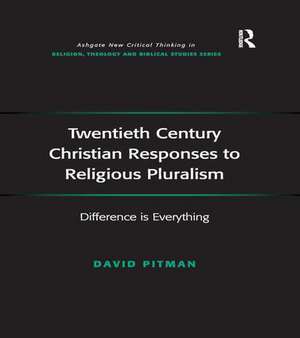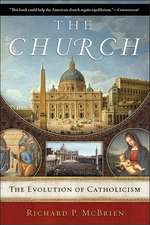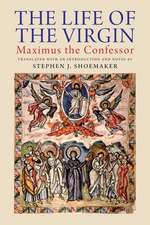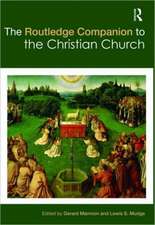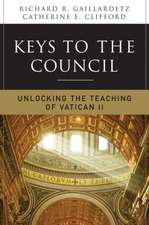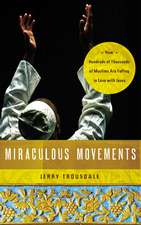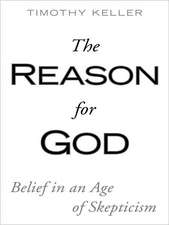Twentieth Century Christian Responses to Religious Pluralism: Difference is Everything: Routledge New Critical Thinking in Religion, Theology and Biblical Studies
Autor David Pitmanen Limba Engleză Paperback – 19 oct 2016
| Toate formatele și edițiile | Preț | Express |
|---|---|---|
| Paperback (1) | 469.34 lei 6-8 săpt. | |
| Taylor & Francis – 19 oct 2016 | 469.34 lei 6-8 săpt. | |
| Hardback (1) | 1059.45 lei 6-8 săpt. | |
| Taylor & Francis – 30 mai 2014 | 1059.45 lei 6-8 săpt. |
Din seria Routledge New Critical Thinking in Religion, Theology and Biblical Studies
-
 Preț: 295.00 lei
Preț: 295.00 lei -
 Preț: 310.22 lei
Preț: 310.22 lei -
 Preț: 311.59 lei
Preț: 311.59 lei -
 Preț: 311.41 lei
Preț: 311.41 lei -
 Preț: 294.47 lei
Preț: 294.47 lei -
 Preț: 313.38 lei
Preț: 313.38 lei -
 Preț: 310.80 lei
Preț: 310.80 lei -
 Preț: 294.30 lei
Preț: 294.30 lei -
 Preț: 311.41 lei
Preț: 311.41 lei -
 Preț: 309.23 lei
Preț: 309.23 lei -
 Preț: 311.59 lei
Preț: 311.59 lei -
 Preț: 309.75 lei
Preț: 309.75 lei -
 Preț: 325.53 lei
Preț: 325.53 lei -
 Preț: 316.66 lei
Preț: 316.66 lei -
 Preț: 311.41 lei
Preț: 311.41 lei -
 Preț: 386.77 lei
Preț: 386.77 lei - 26%
 Preț: 820.71 lei
Preț: 820.71 lei - 26%
 Preț: 764.69 lei
Preț: 764.69 lei - 18%
 Preț: 1059.45 lei
Preț: 1059.45 lei - 18%
 Preț: 1054.71 lei
Preț: 1054.71 lei - 18%
 Preț: 1054.71 lei
Preț: 1054.71 lei - 25%
 Preț: 823.34 lei
Preț: 823.34 lei - 18%
 Preț: 1054.71 lei
Preț: 1054.71 lei - 18%
 Preț: 1058.79 lei
Preț: 1058.79 lei - 18%
 Preț: 1054.71 lei
Preț: 1054.71 lei - 18%
 Preț: 1057.09 lei
Preț: 1057.09 lei - 18%
 Preț: 1055.51 lei
Preț: 1055.51 lei - 17%
 Preț: 190.88 lei
Preț: 190.88 lei - 18%
 Preț: 1056.28 lei
Preț: 1056.28 lei - 18%
 Preț: 700.75 lei
Preț: 700.75 lei - 18%
 Preț: 1054.71 lei
Preț: 1054.71 lei - 25%
 Preț: 767.07 lei
Preț: 767.07 lei - 26%
 Preț: 877.59 lei
Preț: 877.59 lei - 18%
 Preț: 1054.71 lei
Preț: 1054.71 lei - 18%
 Preț: 1057.89 lei
Preț: 1057.89 lei - 26%
 Preț: 765.40 lei
Preț: 765.40 lei - 18%
 Preț: 1054.71 lei
Preț: 1054.71 lei - 18%
 Preț: 1000.27 lei
Preț: 1000.27 lei - 26%
 Preț: 850.17 lei
Preț: 850.17 lei - 18%
 Preț: 1060.25 lei
Preț: 1060.25 lei - 18%
 Preț: 1059.45 lei
Preț: 1059.45 lei - 18%
 Preț: 1059.45 lei
Preț: 1059.45 lei - 18%
 Preț: 1000.27 lei
Preț: 1000.27 lei - 18%
 Preț: 1000.27 lei
Preț: 1000.27 lei - 18%
 Preț: 1054.71 lei
Preț: 1054.71 lei - 18%
 Preț: 1108.37 lei
Preț: 1108.37 lei - 26%
 Preț: 821.13 lei
Preț: 821.13 lei - 26%
 Preț: 820.32 lei
Preț: 820.32 lei - 18%
 Preț: 1054.71 lei
Preț: 1054.71 lei - 18%
 Preț: 1056.00 lei
Preț: 1056.00 lei
Preț: 469.34 lei
Nou
Puncte Express: 704
Preț estimativ în valută:
89.83€ • 93.42$ • 75.17£
89.83€ • 93.42$ • 75.17£
Carte tipărită la comandă
Livrare economică 15-29 martie
Preluare comenzi: 021 569.72.76
Specificații
ISBN-13: 9781138269590
ISBN-10: 113826959X
Pagini: 248
Dimensiuni: 156 x 234 x 13 mm
Greutate: 0.45 kg
Ediția:1
Editura: Taylor & Francis
Colecția Routledge
Seria Routledge New Critical Thinking in Religion, Theology and Biblical Studies
Locul publicării:Oxford, United Kingdom
ISBN-10: 113826959X
Pagini: 248
Dimensiuni: 156 x 234 x 13 mm
Greutate: 0.45 kg
Ediția:1
Editura: Taylor & Francis
Colecția Routledge
Seria Routledge New Critical Thinking in Religion, Theology and Biblical Studies
Locul publicării:Oxford, United Kingdom
Notă biografică
David Pitman began his professional life as a teacher before entering the ordained ministry. He served in a number of parish appointments, spent time with the Methodist Church in Fiji, and for fourteen years taught Ministry and Mission as a member of the Faculty of Trinity Theological College in Brisbane, Australia. He was twice elected to be the Moderator of the Queensland Synod of the Uniting Church in Australia. In his retirement he continues to serve the Uniting Church in various capacities and is an Honorary Research Fellow at the University of Queensland.
Recenzii
’This is a highly competent, well written and very readable survey of the key players in the Christian debate on religious pluralism. It not only provides an important introduction to the field, but makes its own valuable contribution to the Christian theology of religions.’ Philip C. Almond, The University of Queensland, Australia
Cuprins
Preface; Introduction; Chapter 1 The Exclusivist Response; Chapter 2 Definitive Exclusivism: Karl Barth (1886–1968); Chapter 3 Hard Exclusivism: Hendrik Kraemer (1888–1965); Chapter 4 Conservative Exclusivism: Emil Brunner (1889–1966); Chapter 5 Moderate Exclusivism: Lesslie Newbigin (1909–98); Chapter 6 The Inclusivist Response; Chapter 7 Traditional Inclusivism: Karl Rahner (1904–84); Chapter 8 Progressive Inclusivism: Paul Tillich (1886–1965); Chapter 9 The Pluralist Response; Chapter 10 Classical Pluralism I: Hans Küng (1928–); Chapter 11 Classical Pluralism II: Raimundo Panikkar (1918–); Chapter 12 Theocentric Pluralism: John Hick (1922–2012); Chapter 13 Anthropocentric Pluralism: Wilfred Cantwell Smith (1916–2000); Chapter 14 Conclusion;
Descriere
Presenting an accessible introduction to the contemporary issues and challenges facing all those engaged in the further development of inter-faith relationships, dialogue and partnership between the world religions, Pitman argues that the future of world peace and prosperity depends on the outcome. This is accomplished with particular reference to ten key Twentieth Century theologians, each of whom had significant influence in the field of inter-religious studies, both during their lifetime and beyond.
